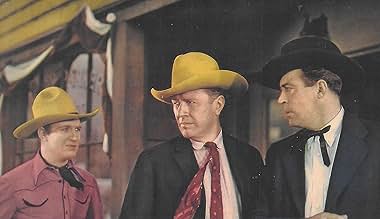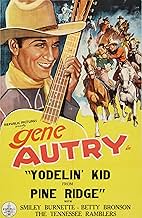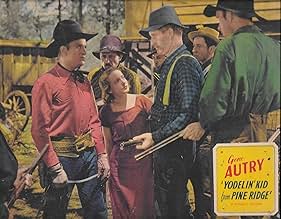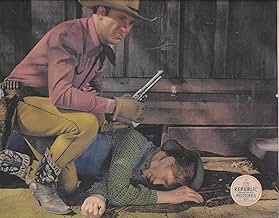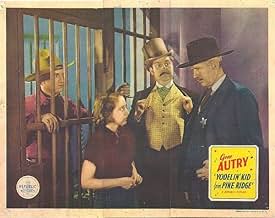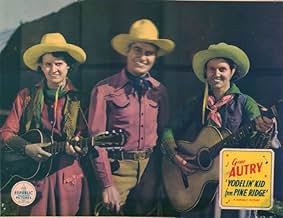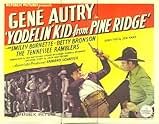Añade un argumento en tu idiomaThe old west range war story transported to Georgia, with Autry as the hero.The old west range war story transported to Georgia, with Autry as the hero.The old west range war story transported to Georgia, with Autry as the hero.
- Dirección
- Guión
- Reparto principal
LeRoy Mason
- Len Parker
- (as Le Roy Mason)
The Tennessee Ramblers
- Comic Musicians
- (as Tennessee Ramblers)
Fred 'Snowflake' Toones
- Sam
- (as Snowflake)
Chris Allen
- Rodeo Spectator
- (sin acreditar)
W.J. Blair
- Member, The Tennessee Ramblers
- (sin acreditar)
Charles Brinley
- Cattleman
- (sin acreditar)
Buck Bucko
- Cowhand
- (sin acreditar)
Reseñas destacadas
This Autry film is one of a hand full of his films that for years has been available to the public only in the 53 or 57 minute cut versions. Recently I had the opportunity to see the restored and uncut version on the Starz Westerns channel a few weeks back and what a difference the added 6 or 7 minutes make. The restored version includes a scene of Gene saddling up and singing a nice trail song as he leaves his ranch following his banishment by his father for warning the rival group. Along the way he meets Millie Branum ( Betty Bronson), a young starving girl he befriended earlier by giving her a calf. Millie gives him his rope back and asks him if he will ever return. Gene replies that he doesn't know and Millie blurts out that she will be waiting for him. As Gene rides away continuing his song you see Millie watching him leave as tears stream from her eyes. Also restored are scenes of newspaper headlines superimposed over rodeo footage of Autry's success on the rodeo circuit. Finally an announcement that he is coming back to Pine Ridge with a traveling show. There is more nice restored footage of the show's parade into town with Champion prancing and marching to the music. (The Champion shown in these scenes is not the original screen Champ since he had only three white stockings . The horse used in these scenes has four white stockings.)However, Gene spots his Dad from the parade route and rides over to him, sticks out his had and says " hello Dad". His father turns and walks away. This movie also contains some of Autry's best riding of all his movies. Many closeup chase scenes and running stirrup mounts that clearly show that it is in deed Gene performing these feats. In all a much more enjoyable movie in the restored version.
This entry is on everyone's must-see list because it co-stars the legendary Betty Bronson. Betty had actually retired from movie-making in 1932, and after this "comeback", she didn't make another movie until A Pocketful of Miracles in 1961. Betty is absolutely lovely here and it's a thrill to see what a fine pair Gene and Betty make in this really top-notch script that helps to make it (as far as I'm concerned) one of Gene's top five pictures. Other assets include a fine support cast led by Smiley Burnette (who excels in what amounts to a character role), LeRoy Mason (a well-spoken heavy), Charles Middleton (Gene's dull-witted dad), and Russell Simpson (a delight as a really nasty piece of work). Good slots are also provided by Jack Dougherty (the heavy's partner in crime), Henry Hall (the sheriff), Jack Ingram and even Art Mix. Mr Toones, on the other hand, has – thankfully! – but one brief moment.
Despite its somewhat off-putting title, this entry shapes up as one of Gene's most vibrant and exciting. Even Joseph Kane, normally a rather humdrum director, seems to have realized the movie's potential and pulled out all stops to make it as thrilling as possible. Production values are great. (If you're quick, you can plainly spot Kane in a rare on screen appearance as one of the turpentiners. As far as I know he actually faced the camera only five times in his lengthy directorial and editing career).
Please note that while the Platinum Disc print is of good quality, it's mastered from the TV cut-down that's missing six minutes of essential footage, including the opening scenes of the street parade, other bits and pieces here and there, and the entire episode where Gene rides away from his home ranch after being dismissed by his dad, encounters Betty who asks him when he's coming back. Gene tells her that he doesn't know. A tearful Betty promises to wait for his return.
Despite its somewhat off-putting title, this entry shapes up as one of Gene's most vibrant and exciting. Even Joseph Kane, normally a rather humdrum director, seems to have realized the movie's potential and pulled out all stops to make it as thrilling as possible. Production values are great. (If you're quick, you can plainly spot Kane in a rare on screen appearance as one of the turpentiners. As far as I know he actually faced the camera only five times in his lengthy directorial and editing career).
Please note that while the Platinum Disc print is of good quality, it's mastered from the TV cut-down that's missing six minutes of essential footage, including the opening scenes of the street parade, other bits and pieces here and there, and the entire episode where Gene rides away from his home ranch after being dismissed by his dad, encounters Betty who asks him when he's coming back. Gene tells her that he doesn't know. A tearful Betty promises to wait for his return.
One reviewer on here said he "couldn't find a single yodel" in "Yodelin' Kid from Pine Ridge". He must have gone to the popcorn stand, or the restroom, just as the movie started, as Gene yodels the first few bars of the theme song over the credits of the movie. Yes, he did yodel, in a number of his early recordings. And yes, so did Roy Rogers. But my opinion is that Gene's yodeling was superior to Rogers'.
Gene Autry started making records in the late 1920s, and many of his early records were his versions of records made earlier by Jimmy Rodgers, who was famous for his yodeling. That's where Gene learned how to yodel.
Gene Autry started making records in the late 1920s, and many of his early records were his versions of records made earlier by Jimmy Rodgers, who was famous for his yodeling. That's where Gene learned how to yodel.
Gene Autry and Ol' Frog put on another great extravaganza which is well directed by Joseph Kane. Betty Bronson always gives a fine performance as the Juliet to Autry's Romeo. Her dad, Russell Simpson is the west's favorite curmudgeon. You can't have a hero without a villain well played by favorite western heavy, Leroy Mason. Great to see a cameo by Fred 'Snowflake' Toones who was a staple in these early westerns.
In Georgia or the Florida Panhandle, the ranchers think the turpentiners are stealing their cattle. Only Gene Autry knows better, and is kicked out by his father, Charles Middleton. The turpentiners hate him too, despite Betty Bronson speaking up for him. Her father, Russell Simpson is mad at her. Autry gets a job with Smiley Burnette's Wild West congress and investigates.
It's a nice B western for Autry, with the Tennessee Ramblers providing a far more hillbilly sound than usual for the series. With good performers, a script that offers a handsome variation on a stock western plot, and Joseph Kane directing, there's good music and handsome camerawork by William Nobles proceeding at a good pace thanks to editing by Lester Orleback.
Betty Bronson rose to fame when she was chosen to play the title role in the silent version of Peter Pan. She was a fine actress, but tastes changed, her producers didn't know what to do with her, and she largely abandoned the screen after her marriage in 1933. This would be her last screen appearance for two dozen years. She died in 1971, largely forgotten, at the age of 64.
It's a nice B western for Autry, with the Tennessee Ramblers providing a far more hillbilly sound than usual for the series. With good performers, a script that offers a handsome variation on a stock western plot, and Joseph Kane directing, there's good music and handsome camerawork by William Nobles proceeding at a good pace thanks to editing by Lester Orleback.
Betty Bronson rose to fame when she was chosen to play the title role in the silent version of Peter Pan. She was a fine actress, but tastes changed, her producers didn't know what to do with her, and she largely abandoned the screen after her marriage in 1933. This would be her last screen appearance for two dozen years. She died in 1971, largely forgotten, at the age of 64.
¿Sabías que...?
- Citas
Col. Millhouse: Marvelous, Autry, marvelous! You certainly have that animal trained and I don't see how you do it. What's the secret?
Gene Autry: The secret in training a horse, Colonel, is that, ah, you have to know more than the horse!
- ConexionesEdited from Annie Oakley (1935)
Selecciones populares
Inicia sesión para calificar y añadir a tu lista para recibir recomendaciones personalizadas
Detalles
- Duración1 hora
- Color
- Relación de aspecto
- 1.37 : 1
Contribuir a esta página
Sugerir un cambio o añadir el contenido que falta

Principal laguna de datos
By what name was Yodelin' Kid from Pine Ridge (1937) officially released in India in English?
Responde
